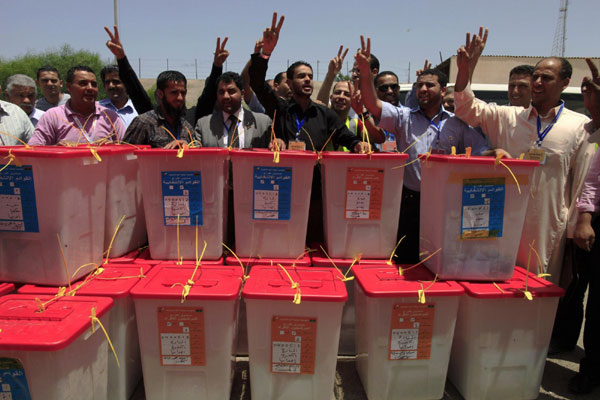Libya's ex-interim PM leads in election
 |
|
High Election Commission workers chant the national anthem behind ballot boxes which just arrived from the region of Kufra, five days after Saturday's landmark national elections, at the High Election Commission Center in Tripoli July 12, 2012. Voting in Kufra was held up by security problems in the area, with anti-poll protesters attacking election facilities. Libyans, relieved that their first free national election in 60 years had survived violence and protests, celebrated the chance to draw a line under Muammar Gaddafi's dictatorship and forge a brighter future for their North African country. [Photo/Agencies] |
TRIPOLI - Libya's National Forces Alliance (NFA) led by Libya's ex-interim Prime Minister Mahmoud Jibril is leading in the country's first free national elections held on Saturday, preliminary results show.
Final results of the elections are expected next week. But with a majority of votes counted, Jibril's alliance had unbeatable leads in many cities and regions, including the capital city of Tripoli and the eastern city of Benghazi, cradle of last year's unrest that toppled long-time leader Muammar Gaddafi.
In five districts in Tripoli, Jibril's alliance and his allies won over the Muslim Brotherhood's Justice and Construction Party, according to partial tallies on Thursday.
Libya's electoral commission said Wednesday that NFA took 95,733 votes in Benghazi, while the Justice and Construction Party won 16,000 ballots.
NFA, labeled as liberals, is the second largest political alliance behind the Justice and Construction Party. It said on Wednesday that it hoped to gain at least half of the 200 seats in the congress, 55 by the alliance and 45 by allied independents.
The Islamists said they expected to dominate the congress by forming alliances with like-minded independents.
The elections adopt mixed systems with independent candidates elected by simple majority and party lists elected by proportional representation.
A total of 120 seats in the country's General National Congress are reserved for independents, while the remaining 80 seats have been set aside for party list candidates, according to the final draft of the country's electoral law published early February this year.
A total of 374 political organizations and 2,639 individual candidates have contested in the elections. More than 2.7 million people in Libya, or about 80 percent of the country's eligible voters, had registered to vote. Voter turnout was 60 percent, according to statistics of the High National Electoral Commission (HNEC).
Earlier this week, Libya's National Transitional Council (NTC) said that it would hand over power in four weeks after the new congress is elected
The 102-member NTC, which was established during last year's civil war and is currently ruling the North African country, will be officially dismissed after election results are announced.
The 200-member congress is expected to replace the ruling NTC to supervise the government and oversee the drafting of a new constitution. The congress is also tasked to organize parliamentary elections next year.
Before Saturday's elections, analysts deemed that tough security challenges and tendency of federalism in the eastern region will leave an open question whether the landmark elections will pull off without a hitch.
However, as high as 98 percent of polling stations ran smoothly except for some sporadic violent disruptions, according to HNEC statistics.
The UN Security Council on Tuesday welcomed the smooth electoral process in Libya, the first free national elections in the North African country in more than 40 years, lauding it as "a milestone for Libya's democratic transition."
The French Foreign Ministry, in a well-wishing note, congratulated the Libyan people for the strong mobilization. "It shows the will to make the transition successful and turn the page on years of dictatorship to now build a state with a rule of law," it said.
Chinese Foreign Ministry spokesman Liu Weimin said the elections were an "important step" in the country's political transition process.
The South Korean Foreign Ministry said the elections had "historical significance."
HNEC chief Nuri al-Abbar said that 94 percent of the polling stations ran smoothly, but violent disruptions were observed at some poll stations, especially in eastern Libya.
NFA had fielded 70 candidates across Libya in the elections. Jibril has described his alliance as a "moderate Islamic movement," although many Western media had labeled it "a liberal alliance."
However, NFA's victory does not automatically mean it would dominate the next congress, in which independents are expected to hold the majority.





















